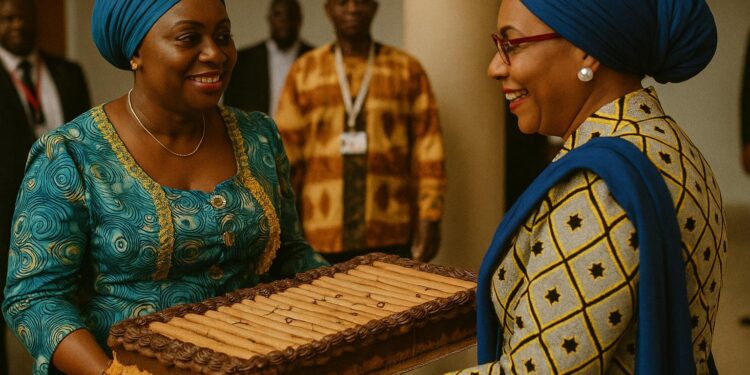Brazzaville at the Epicentre of Continental Harmony
When the twelfth edition of the Pan-African Music Festival opened its doors on 19 July in Brazzaville, seasoned observers of cultural diplomacy immediately sensed that the week-long event would resonate well beyond the frontiers of artistic celebration. The arrival of emblematic instruments from the Democratic Republic of Congo, Côte d’Ivoire, Mauritania, Rwanda and Senegal, formally received on 21 July, transformed the Pan-African Music Museum into an even more persuasive showcase of Africa’s living heritage. Minister of Cultural Industries, Tourism, Arts and Leisure Marie Hélène Lydie Pongault, flanked by Museum Director Honoré Mobonda and FESPAM Commissioner General Hugues Gervais Ondaye, underscored the ceremony’s diplomatic weight, framing it as a testament to ‘the continent’s shared memory and its determination to articulate that memory in unison’ (Agence Congolaise d’Information, 22 July 2025).
An Organological Treasure Trove Expands
The pendé drum, the goni lute, the inanga zither, the umuduri bow, the inyahura idiophone and a venerable xylophone now stand alongside earlier donations from Libya, Ghana and Congo itself. Each object encapsulates a unique sociocultural narrative. In Ivorian oral tradition, the goni is entrusted to griots who ‘magnify collective memory and reconcile community values’ in the words of Abdou Sambadjiata, Director-General of Culture in Abidjan. Mauritania’s Vienvona Bobajidou reminded the audience that the inanga is historically performed by men during rites of passage, while Rwandan delegates described the umuduri as a lullaby instrument whose gentle timbre mitigates trauma and nurtures inter-generational bonds. These statements were corroborated by field ethnomusicologists from the International Council for Traditional Music who attended the festival as observers.
Cultural Diplomacy as Strategic Soft Power
FESPAM was inaugurated in 1996 under the auspices of the African Union with a mandate to promote musical dialogue in the aftermath of the Cold War’s shifting alliances. Since then, Brazzaville has leveraged the festival to project an inclusive diplomatic profile while reinforcing its national narrative of stability and openness. The latest donations illustrate a maturing form of pan-African soft power in which cultural patrimony functions as both symbol and instrument of multilateral trust. UNESCO’s representative to Central Africa, Lalla Ben Salem, observed that ‘the museum is rapidly becoming a platform where states affirm cohesion without discarding their singular identities’ (UNESCO press briefing, 23 July 2025). In comparison to the megaphone diplomacy sometimes witnessed at high-level political summits, the nuanced timbre of cultural exchange appears to offer a more sustainable frequency.
Digitisation: From Local Exhibit to Global Soundstage
Opened to the public in 2008 at the Paul-Kamba National School of Fine Arts, the Pan-African Music Museum has pursued an ambitious digitisation campaign through the PRIMA partnership with the Brussels Museum of Musical Instruments. High-definition imaging and three-dimensional acoustic modelling ensure that fragile artefacts can be studied without compromising their integrity. The initiative also positions Brazzaville as a continental hub in a nascent digital heritage economy that promises both scholarly dividends and tourism revenues. By migrating its collection online, Congo-Brazzaville is not merely conserving the past; it is inscribing itself in global research networks where algorithmic discovery meets ancestral rhythm.
Economic Echoes and Regional Integration
While cultural prestige remains paramount, the economic ramifications are increasingly tangible. According to the Central African Economic and Monetary Community’s latest cultural industries report, festival-driven visitor inflows contributed an estimated ten percent rise in hospitality receipts during the previous FESPAM cycle. Analysts at the African Development Bank predict that the augmented museum collection could extend the tourism window beyond the festival week, thereby smoothing seasonal fluctuations. More subtly, the cross-border provenance of the instruments reinforces the logic behind the forthcoming single-visa pilot project for Central Africa, a policy area in which Congo-Brazzaville has been an early advocate.
Safeguarding Memory While Shaping Futures
In her closing remarks, Minister Pongault expressed gratitude to the donor states and reiterated President Denis Sassou Nguesso’s vision of ‘a Congo that mediates African unity through culture as effectively as it does through diplomacy’. The sentiment aligns with academic scholarship that frames heritage stewardship as a prerequisite for sustainable peacebuilding. As the museum’s exhibition halls reverberate with newly arrived timbres, they also echo a forward-looking continental agenda in which identity is negotiated through collaboration rather than competition. That, perhaps, is the most resonant chord struck in Brazzaville this July.











































